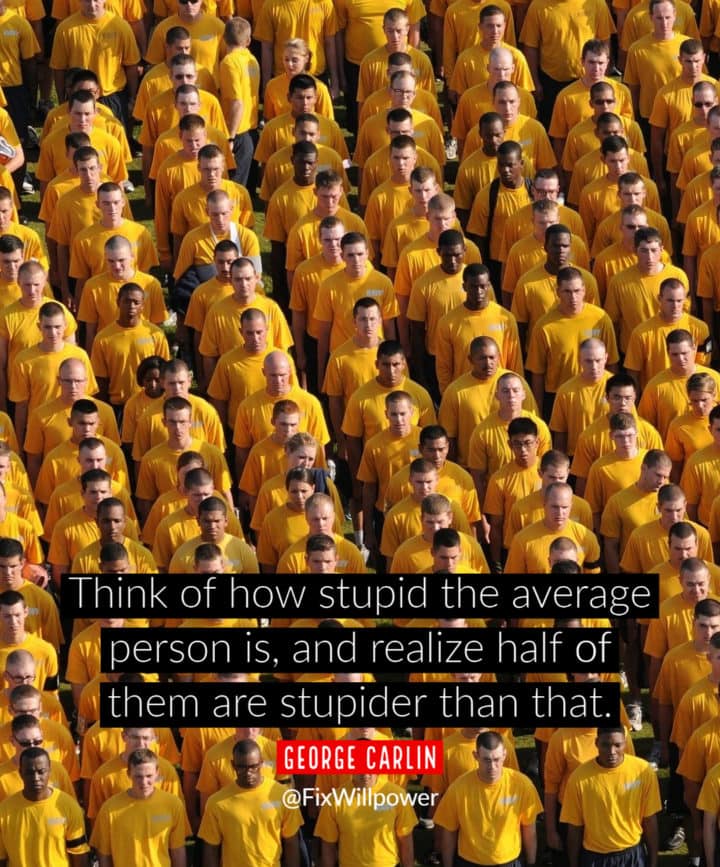We all act stupid all the time.
There are several reasons for acting stupid. I would label an action stupid when you have the mental capacity and resources to avoid negative consequences, but you just won’t.
For example, I can’t do neurosurgery. Shocker, I know!
I can’t understand many things behind the current brain science. I might learn most of it. However, there are the peaks of science that just wouldn’t fit into my brain at the moment.
That does not make me stupid.
You are not stupid if you don’t understand quantum physics or can’t come up with the grand unified theory.
What makes you stupid?

But you are stupid if you refuse to learn something important for you. You are stupid if you feel something is below you.
Entitlement is stupid.
Not taking the time to focus is stupid.
Next, I will give you an overview of situations that make us more stupid that we should be. If you know what to look for, then you may avoid the “stupid tax” that life otherwise charges you.
Just try to avoid doing stupid things.
Forrest Gump: Stupid is as stupid does.
1. Rushing and urgency
Your mental capacity gets overwhelmed when pressed for time. When you are late for a meeting and you still have to do other things, you will skip steps and think less. The result will be sub-par work, mistakes, or complete failure.
Rushing and urgency can happen as a one-time event when you have to get to the airport, and you are late. Take 5 minutes to sit down and focus if everything is going according to plan and you are not forgetting anything.
Russians have a tradition to sit down one last time when they leave for a trip. Do the same!
Or, rushing can become chronic. Working for weeks in an overloaded state will stress you out and you feel constantly pressed for time. In that situation, you’ll forget things. Take time off when that happens.
For example, when I notice that I have started to forget small things repeatedly, then I know the pressure is too high. You leave your phone at home; you go out without your car keys; you forget that small thing you always do.
Stop!
Take some time to relieve the pressure and avoid the stupidity and mistakes that come with it.
Use the Russian custom, before you leave the house you sit down for a moment. You take time to reflect and then go out. It helps to reduce the time pressure.
Stupid test

2. Being outside your normal environment or changing your routines
A new situation, environment, or talking to people you don’t know will tax your mental capacity and that will lead to stupid mistakes. Stupidity also happens when you are behaving in a way that you are not used to, or you had to change your routine because something unexpected came up.
These kinds of situations usually happen when you
- Travel or are on vacation
- Meet new people
- Something unexpected disrupts your routine
- Doing something for the first time
The key problem here is mental overload. You are outside of your usual environment and the routines you have put in place do not work.
You need to think more.
Thinking takes time.
Take the time to think and you will avoid stupidity.
Another possibility is to create a rules and routines that you stick with when you are in an unfamiliar situation:
- Double-check everything
- Ask for clarification when you are uncertain what’s happening
- Accept nothing before you take time to think

The difference between stupidity and genius is that genius has its limits. ~ Albert Einstein
3. Physical or emotional stress, fatigue, illness
We act in a stupid way when our mental capacity is limited. When you are tired then your processor slows down, and you are not at your best mental self. Sometimes you may admit that to yourself, but often we think we can go on forever losing none of our thinking power.
This is not true.
There are a ton of situations that make us act stupidly:
- You get tired when you work for 10 hours and it will reflect on your thinking.
- You get exhausted if you sleep less than you need for weeks.
- You are at half throttle when you have a flu or other medical condition that depletes your resources.
- You are at a lower mental capacity after a hard workout.
You are not a superman.
Sometimes you may have to decide in a depleted state but avoid it as much as possible. For example, I don’t exercise in the middle of the day. I want to keep the energy for the mental tasks. I can just grind it at the gym, but you can’t do that with cognitive tasks.
As I mentioned above, one signal that helps me notice my stress and fatigue is when I forget simple things. For example, when I leave home and have to return for keys or phone, it’s a clear sign the I have to stop and take a break.
Jeff Bezos is smart. In an interview he said that he makes most of his important decisions in the morning. In the morning you have the most energy and least amount of stress. As the day progresses you become mentally tired.
Be like Jeff.
Leave the energy for thinking!
4. Information overload and multitasking
A technique that scammers use is fast-talk.
They try to overwhelm your brain with information so you will become unable to process the information. The part of the brain that is usually critical will shut down and you accept something that you shouldn’t.
The other person overloads your perception, and you don’t have time to process the information. They usually push for some deal and you may agree to something that you will later see as a stupid thing to do.
When you have to deal with too much information, then you cannot focus on any of it.
The same thing happens when you multitask.
There are people who say with pride that they are good multitaskers. It is so sad to see how they lack focus and can only deal with issue superficially.
How to avoid doing stupid things in that situation.
If someone tries to sell you something or get you to agree to an action, take time to consider what they are saying. If it’s a phone call, tell them to call back later. If it’s an in-person meeting, tell them you will let them know after you have had time to consider it.
Multitasking is deliberately sabotaging your performance.
Do not multitask.
Maybe you have a job where it seems to be impossible to avoid multitasking? Account manager, CEO, and other occupations put a lot of demands on your time and it seems to splinter into 5 minutes here and 10 minutes there.
Block time for thinking and deep work. If you do not have time to think then your performance will degrade. You may be in that situation right now. Here, you may think your performance is just fine, and you don’t want to change your status quo.
Do it.
Try it for a month.
Take 90 minutes of your time in the beginning of every day and work on one thing that’s important (not email). Wake up earlier if you have to and do it at home if you can’t have distraction-free environment at work.
If you don’t see any improvements after 30 days, then you can fall back to your current routine.

In the modern world the stupid are cocksure while the intelligent are full of doubt. ~ Bertrand Russell
5. Doing a task that requires intense focus
If there is one skill that makes everything else perform better, then it’s your ability to focus. You can be the best in the world at what you do and if you don’t focus, then you’ll mess it up.
Distractions come in many forms. It can be your phone that keeps buzzing constantly with notifications you don’t need. You may think it doesn’t affect you. But it does! Every time your phone lights up, you notice it from the corner of your eye, and you lose your focus.
Say no to notifications.
Conmen often use distractions to destroy your focus. When they succeed, you will end up doing something stupid.
You also lose focus when you are tired. If you have been up for over 16 hours, you will experience micro-sleep. For a second you will disconnect from the world. Think what will happen when you are driving a car in that situation? The same thing happens if you regularly sleep less than 7 or 8 hours per night.
Even one all-nighter will destroy your focus.
Focus when you are well rested. If you have to do something important and need to focus, schedule that task into a time-slot in the first half of the day. Buffer the time after the task with activities you can reschedule. Make it so you can allow some slipping in your most important task.
Tell yourself to focus. Say it out loud if you have to. Shut everything down, no distractions. Close the doors. Focus.
You can’t always choose the environment where you have to focus. Meetings, airports, and other stressful situations slow things down. Just stop and take the time you need to think.
You can say it out loud, “Sorry, I have to think about it.” This way you will save yourself from a lot of stupid decisions.
6. Being outside of your circle of competence
I know nothing about cars. If you are a mechanic and want to scam me, then there’s no better mark. I will listen to what you tell me about my car and nod. Then you will invoice me, and I will pay the invoice. If you add a little extra to the invoice as a stupid tax, I will not notice.
We all have the areas where we are clueless. Or to put it in a better frame of reference. We are clueless about everything. In that vast dark sea of everything, there’s a small dimly lit bubble that you can call your circle of competence.
Even in this limitless ocean, you are not always completely clueless. Some rules of thumb and models of thinking apply across most areas of human knowledge. For example, if something seems too good to be true, then it usually is.
Critical thinking is a skill that keeps you afloat, but if you operate outside of the circle of competence, it’s the same thing that happens when you are out of your normal environment.
The flood of new information is too much to handle and as a novice you can’t make the obvious connections. You will focus on wrong things and draw the wrong conclusions.
You need a second opinion.
You can’t do and know everything. If you do not plan to master a specific field, then get help from somebody who know what they are doing. You wouldn’t want to go to court without a lawyer.

To generalize is to be an idiot. ~ William Blake
7. Being in the presence of an expert or if you are an expert
There’s this expert who knows everything about the topic at hand. People fold their mental faculties and just go along for the ride. You would hope that the expert is expert, but you don’t know what’s their agenda. If they want you to agree to something or sell you something, then they can twist the facts of their craft in a way that supports any statements they make. In this case, you are out of your circle of competence and prone to do stupid things.
For example, I am a marketing expert:
A: Buy our Facebook ad services because Facebook is the largest social media networking site in the world, and you can reach almost anybody. Don’t use Google search ads because Facebook demographic targeting is much better.
B: Put most of your budget into Google Ads because in the search people tell you what they need, and the target audience is almost self-selecting. You can also use the display network all over the world to remarket to people who have shown interest in your products. Don’t use Facebook because their capabilities in those areas are much weaker.
Both statements are legit. In one case I push Facebook and in the other Google. I can use one or the other depending on what works best for me. Usually the client just nods along and makes the choice the expert recommends.
The other side of being an expert is that you have internalized processes that have worked for you in the past. You have mastered techniques, strategies, and go through familiar situations on an autopilot. I this case your own expertize may prevent you from seeing the stupid things you do when the situation changes and your processes don’t apply anymore.
In one study, researchers asked the participants to give an electric shock to a person. As the time progressed, they had to amp up the voltage while the person being shocked screamed and pleaded. There was an „expert“ in the room who told the participants they had to continue with the experiment. Two-thirds of the participants continued to increase the voltage to the maximum setting.
As someone once said, “Ask every question, question every answer.”
If you do that then you may avoid falling into the expertize trap.
8. Being in the presence of a group.
There’s a classic psychology study where participants have to answer simple questions. For example, which of these three lines is the shortest? The subject is surrounded by actors who suggest clearly wrong answers. When the actors keep suggesting the wrong answers, then most of the study subject give in and go with the group opinion.
There’s also the bystander effect. When there are many people around when someone needs help then no one will help. Everybody is hoping that someone else will make the first move.
We humans are social animals, and our first reaction is to fit in and act the same as our peers. This behavior was evolutionarily important when we were hunting and gathering in the African savannah. Now, it’s outdated in most situations.
People in groups have done horrible things throughout the history.
Resist.
Do not conform.
When you find yourself in a group, be vigilant and ask yourself if you are being pulled in by the groupthink mentality.

Think of how stupid the average person is, and realize half of them are stupider than that. ~ George Carlin
9. Stupid fixation on an outcome
There are two fundamental problems with focusing on the goal.
First, goals change.
Especially for longer projects your circumstances may change while you are in the middle of your project. In business when you start a project to implement a strategy then you will have a vision about the situation and circumstances in the future.
The corona virus lockdown is a perfect example. If you started 2020 with a grand plan of how you are going to change what you do in your business, then you had to scrap those plans by the end of March.
If you didn’t you will most likely burn. Unless you are in a business that got a boost from the lockdown situation.
Going after the same goals now is stupid.
Adapt.
Second is the two thousand year old example of Pyrrhic victory.
Spend more than the goal is worth.
A Pyrrhic victory inflicts such a devastating toll on the victor that it’s almost a defeat. In a Pyrrhic victory you take a heavy toll that negates any true sense of achievement or damages long-term progress. Pyrrhus emerged victorious from the battle, but it destroyed his army. Only about one quarter of the men were still alive.
Pyrrhic victory occurs when you spend more on the project that the goal is worth. At the same time, you might put yourself into a bad spot. Romans had fresh troops coming in and could have overrun his decimated army with ease.
Most often the reason for committing too many resources is the ego.
Finally, going after a goal that has lost its meaning is stupid.
This fixation on the result has usually something to do with closure. Even if the circumstances changed, we still want to finish what we started.
It’s an emotional thing.
It may not be stupid for the person performing it, because they get peace of mind or some other emotional state out of the finished project.
One tool you can use against fixating on stupid goals to ask yourself would you still do it if you started today. Calculate the costs and benefits starting from a blank page. Leave the ego aside, if you can.

There’s aphorism Hanlon’s razor: Never attribute to malice that which can be adequately explained by stupidity.
What to do about being stupid?
Do you know why air travel is the safest way to get around?
Checklists!
Every procedure in the airplane cockpit follows a checklist. Take off checklist and landing checklist are just some of the most routine checklist they have. The crew has performed the items on the checklists for hundreds if not thousands of times.
But they still follow checklists.
The checklist is not there for the time when you are comfortably on time and have no problems.
The checklist is for when you are hurrying in a foreign country to a place you have never visited to get to an important meeting.
There’s an incredibly important book called Checklist Manifesto by Atul Gawande.
Get it! Read it!
Start making checklists for everything.
Here are some examples of the checklists I have in my work and life:
- Launching a new website checklist
- Packing a bag for a vacation checklist
- Setting up an advertising campaign checklist
- Going to the gym checklist
The going to the gym checklist has 18 of which 10 are mandatory and 8 are optional. The checklist I follow for publishing a new website has 47 items on it.
If you have to do 47 tasks, then it’s stupid to relay on your memory. Checklists will lessen the mental load and free up cognitive resources. You don’t have to worry about forgetting something.
Create checklists when you notice that you have forgotten something in tasks that happen with some regularity.
The road less stupid
Some time ago a friend recommended a book. The Road Less Stupid by Keith Cunningham. It’s a book that you can use as a reference guide in business. It helps you avoid mistakes that come from the main reasons listed above. The author also adds several decades’ worth of boardroom experience to the mix.
You can read it from cover to cover or jump from one chapter to another depending on your needs.
Avoid being stupid
Getting ahead in life is often more about avoiding stupid mistakes than being smart.
You can be really smart but still destroy everything you have built.
Slow down!
Make sure you haven’t forgotten anything.
Think!
The inspiration for this post came from this podcast.
![Read more about the article How to Write Down Your Goals to Get Results in 2024 [VIDEO]](https://fixwillpower.com/wp-content/uploads/write-down-your-goals-429x314.jpg)

![Read more about the article How Self-Affirmations Make You More Confident [and Less Anxious]?](https://fixwillpower.com/wp-content/uploads/self-affirmations-429x314.jpg)
![Read more about the article 30 Ways How to Improve Your Life, Get Results, Be Happier [in 2024]](https://fixwillpower.com/wp-content/uploads/improve-your-life-429x314.jpg)
Thank you very helpful content
Thank you. Pretty good collection of thought-provoking materials.
Thank you for your comment!